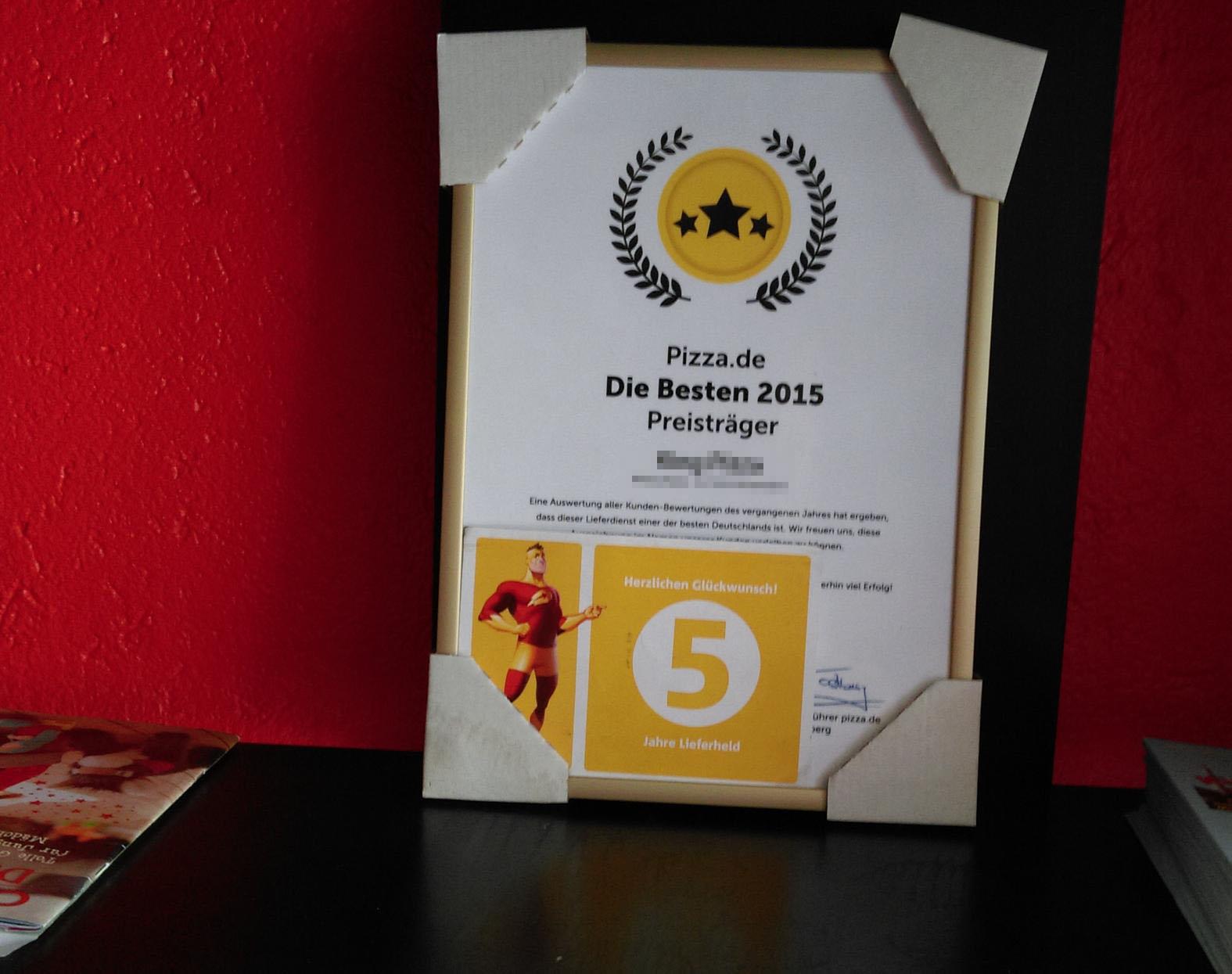This article originally appeared on VICE Germany
“It tasted really good,” I say, but the chef can see in my eyes that all I want to do is scream and run and scream and run from the half eaten Margherita pizza on my plate. “I try my best,” he says, “but it’s just too much work for me.” As I rush out the door, I glance back briefly and spot him standing in the kitchen, just staring at the floor. I should never have come here.
Videos by VICE
How bad could a pizza restaurant really be? Well, in July 2017, a judge sentenced the owner of this pizzeria to 18 months probation for repeatedly breaking health regulations. Inspectors found mould, contaminated tuna, expired turkey, filthy chopping boards and a floor covered in grime. When they returned a few weeks later, the owner still hadn’t thrown the expired stuff out – it had gone straight back in the fridge. He claimed he had tried to get rid of the festering items, but his neighbours complained about the smell from his bin, so, for reasons only he understands, he decided to put them back in his freezer.
Unsurprisingly, the court didn’t take his excuses seriously. If it happened again, the judge warned, the owner would go to jail. Even his defence lawyer recommended he sell his pizza business and do something else, but the man wouldn’t listen. He was adamant in court that he wanted to make his pizzeria to work. I thought it would be a good idea to eat at a place an actual judge considered borderline criminal and see if our pizza chef could really turn things around. It can’t be that hard to make a half-decent pizza that not topped with rotting meat. Right?
When I arrive at the restaurant on a hot afternoon, the shop’s door is shut and there is no sign of life inside. I decide to dial the number on the window; it rings and rings, but eventually a sleepy voice answers.
“Hello?”
“Hi, I’m outside your shop and I would like to order a pizza.”
“This isn’t the best time, but, eh, I’ll do it. What do you want?”
“A medium Margherita.”
“Ok, it’ll be a while though. I’ll be there in 10 minutes.”
As I wait for him, I debate whether I should tell him that I’m a journalist. He’ll be weary of me and any more bad press, but, on the other hand, he’s endangered the health of his customers by not taking basic food hygiene seriously. Before I can make up my mind, I spot him running up the street, sweating heavily in the heat. I briefly consider running away, but he reaches me faster than I can think.
Watch: In Search of the World’s Best Pizza
All I know about him is that he’s a 49-year-old former truck driver who fled Pakistan in the 90s, and is now trying to just get by through selling fast-food the best way he knows how. I notice his hair is a little grey, as he approaches me. “Are you here for the pizza?” he asks hesitantly, as if he’s surprised to see an actual customer. I nod reluctantly. “Ok, great,” he says with a huge smile. “It’ll take a while because you’re my first customer today.”
He closes the shop door, turns the lights on and heads straight into the kitchen, while I look around. I’m suddenly hit by the strong smell of chicken curry. The restaurant is very small. On the left is a small kitchen with a fridge, and on the right is a sofa with a table and another fridge with fizzy drinks. The wall is decorated with loose wallpaper and a few photos from a trip to India. The floor is clean, which shows he’s at least made some effort since the trial. The kitchen, however, is quite messy – there are pots and pans everywhere, scattered between cardboard boxes and a bucket of salt.
The menu consists of about 100 dishes. A selection of €6 to €8 pizzas rest alongside a range of curries, pasta dishes, dumplings and several stir-fries. Underneath a shelf that holds bottles of vodka and wine, hangs a certificate from an online delivery service naming the restaurant one of the best of 2015, which is surprising, to say the least.

The chef pops out briefly to let me know that the pizza is still a long way from being ready, before disappearing back into the kitchen. I want to use the toilet, but the door is locked. “Blocked, unfortunately,” he shouts. When I go to take a drink from the fridge, I find mushrooms, salad and chicken breasts in the bottom drawer. I want to check the expiry date on the chicken, but I’m too worried that he might catch me.
A few moments later, he comes out of the kitchen to join me at a table. He’s really nice, but I decide it’s time to talk about his recent publicity. I ask him about the stories in the press and whether he had made some improvements. He acts shocked. “What? I was in the newspaper?” he replies. It’s hard to tell whether he has genuinely forgotten about the pizzeria’s public problems or if he’s just trying to fool me. I remind him about the court’s verdict. “Oh,” he says.
He turns away and looks at his feet. He’s no longer smiling. “It’s fine now,” he tries to assure me. “I’ve cleaned up. The inspectors came early in the morning, on a very busy day for me, and so I hadn’t had time to tidy up. But now everything is good.” You can tell from his voice just how badly he wants that to be true and how much this restaurant means to him. When I mention that the restaurant looks clean and ask whether he expects the inspectors to return, he looks me up and down, clearly wondering whether I may be an undercover agent, before laughing. “Cleanliness is like the sea,” he eventually says. “You can clean as much as you like, but the dirt will always come back with every wave.” I can’t help but smile as I imagine him riding out into a sea of grease, battling waves of expired chicken breast and mushrooms.
“I’m a journalist, by the way,” I reveal, “and I’m here to test out the pizza.” He stares at me in silence for a few moments, then smiles, without really acknowledging what I’ve said. Suddenly, he runs to the kitchen. “Shit,” he shouts. I can smell burning.

A few minutes later, he returns with my order. The topping is only slightly burnt; otherwise, it looks like a pretty standard Margherita. I take a bite as he stands closer to me. “Good?” he asks, and I nod, but truthfully the topping is too salty, the base is soggy and only the crust is cooked through. He smiles and stares for a bit longer – I don’t know how long he plans to watch me eat. He looks at his feet and then he notices my camera.
“And you are from a newspaper?” he asks quietly. I put my slice of pizza back on the plate. “Do you write about pizza?” I mumble a faint, non-committal reply. He asks me again what I think about the pizza and I reassure him that it’s okay. “I’m getting better,” he says. “I’ve been doing this for three years, and now I have the experience. I used to drive trucks, but I prefer pizza,” he taps his stomach laughing. He tells me that he has never received any training. So what does the court decision mean for his future. “What else can I do? I’m going to clean more, and try to my cooking skills,” he says. “Enough customers are still coming – I don’t need many.”
I take several more bites. It’s bad, but is it the worst pizza in Germany? Probably not. The door is still open and the humid air mixes with the lingering curry smell. Half of the pizza remains in front of me as I ask to pay. “Did you really enjoy it?” he asks again, as if he himself can’t believe anyone would enjoy his oily creation. “Of course,” I reply.
“Do you want to take the rest with you?” I know I won’t ever eat another bite of this, but I still can’t bring myself to say no, so he wraps it in tinfoil and hands it over. As I take a few more pictures before I leave, he asks the unavoidable question: “Are you going to say nice things about me in your article?” I freeze for a moment, before telling him that I’ll take his name out of the piece – the only honest reply I can give. He looks at his feet. “So you didn’t like it?” The room suddenly feels very warm and small. I manage to mutter a pitiful “No”. “I do my best and try and learn something new every day,” he says, “but it is just so much work.” Then he turns away as I race out of the shop.
“People didn’t like my pizza. Some said it had too little salt, others too much – just like you. I don’t know what to do anymore.”
I feel terrible as I walk back to the train station. He’s already had the inspectors and the trial to deal with, he didn’t need me turning up too. The least I owe him is some constructive criticism – maybe it will help him fix some of his problems, I think. The next day, I decide to call him.
“Hello?”
“Hi, I was at your shop yesterday to test the pizza.”
“I remember.”
“I wanted to get in touch again…um…”
“Yeah?”
“You asked if the pizza tasted good…”
“Yeah.”
“It wasn’t that good. I thought it was a bit too salty.”
“OK, thanks. I’m glad you rang.”
He goes on to admit that he, too, wasn’t entirely honest. He hardly gets any clients these days, and he hardly makes enough to live on. He’s built up debts of almost €10,000 (£9,000). “It’s been hard for me,” he says. “So damn hard.”
He used to deliver packages but it was a “back-breaking job.” One day, apparently, he visited a friend who owned his own pizzeria and was immediately attracted to the idea. He took out a loan and opened his own spot. Things started off well, but at some point, the customers dried up.
I ask him why. “People didn’t like my pizza,” he says. “Some said it had too little salt, others too much – just like you. I don’t know what to do anymore.” He wants to stop making pizza, but he can’t because of his debts. He doesn’t know what else he can do other than drive trucks and cook pizza, but he’s looking for an alternative.
Before we hang up, he asks me one more question: How can he make his pizza better? “Maybe add some basil and mozzarella,” I suggest, “like they do in Italy.” Sounds like a good idea, he says. Just before we say our goodbyes, he tells me that his wife is eight months pregnant with their third child. “Life is not all bad,” he laughs.
More
From VICE
-

Screenshots: Trigger, Bandai Namco Entertainment -

Screenshot: The Indie Game Awards -

Collage by VICE -

Screenshot: Game Science
